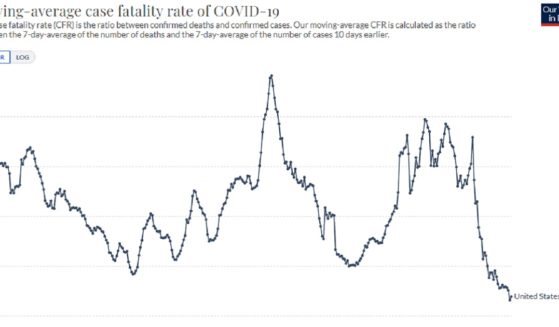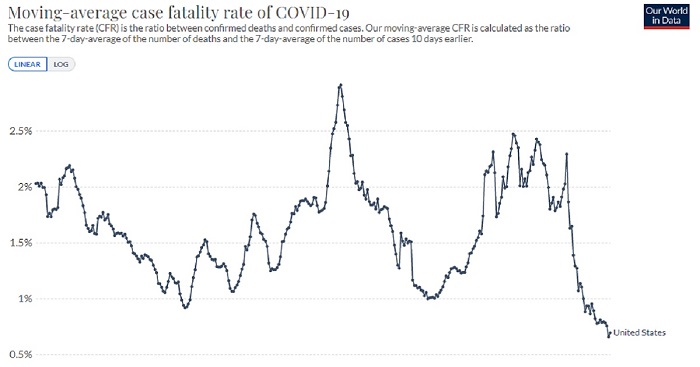
We’ve been hearing a lot about the delta variant lately, and it’s no surprise to see COVID-related fears flaring up again.
Everyone’s asking how this variant might affect them if they are unfortunate enough to catch it — with or without a vaccine or natural antibodies already inside them — and it seems like the answers keep coming in a more confusing way each time.
But it’s important to note some other key info surrounding the coronavirus that has consumed nearly a year-and-a-half of our lives, particularly the fatality rate we heard so much about in the past.
It seems we’re hearing less and less about it now than we did before, however.
Why is that?
Our World in Data is a good source for many of your COVID-related statistical needs.
From its graphs, adjustable variables, easy-to-interpret illustrations, etc., you can learn more about many things — ranging from the fatality rate in the U.S, to the number of fully vaccinated persons and the number of confirmed cases or variants in the country (just to name a few).
The source also invites you to compare numbers between nations — or look at how another individual country is faring in terms of its COVID-19 data.
In any case, as we adjust the COVID-19 Data Explorer to display the fatality rate in the United States, we see a sharp decline beginning around July 15 — a decline taking us from 2.29 percent to around 0.70 percent as of Tuesday.

This data out of John Hopkins University Center for Systems Science and Engineering indicates we are now experiencing our lowest COVID-related fatality rates since the onset of the pandemic.
It’s a sharp contrast to a few short months ago when the fatality rate in the U.S. reached 2.91 percent around March 2. And it begs us to ask why news of this decline isn’t more widespread.
Taking a look at confirmed cases offers a more petrifying image to those afraid of being infected, however.
Since July 5, we’ve risen from 35.73 cases per million people to 352.63 cases per million people.
Why? We can blame the delta variant for this one.
But one aspect of the popular narrative that doesn’t make much sense is how the delta variant is sometimes characterized as more deadly.
(On Friday, National Geographic headlined an article, “Why is Delta more infectious and deadly? New research holds answers.” On Saturday, CNN’s Jim Acosta called it the “DeSantis variant” while mocking Florida Gov. Ron DeSantis, and attempted a painfully awkward jab about “paying for all of the funerals in the days to come.”)
Yes, we have a significant number of people who possess antibodies through vaccination or through their own previous COVID infections, but as the delta variant replaces the alpha variant as the primary strain we’re seeing, why isn’t it claiming more people who have had no exposure to the virus from the start?
Turns out, Americans are faced with another confusing narrative — the COVID vaccines work, but the pandemic image of masked faces still goes on in delta’s presence.
Yes, we can expect breakthrough infections (infections of those who’ve been vaccinated). Yes, we can note that the delta variant is more contagious and therefore warrants extra caution — perhaps even among the vaccinated.
But, at this point, Americans have elected to get both jabs or none. Let that be their decision, just as they can assess their own COVID-related risks in other ways.
We see the fatality rate declining at the moment, but the establishment media’s fixation remains on the brooding, powerful presence of this variant that’s taking the country — and the world — by storm.
We can speculate why they’re avoiding reporting any progress: Governments that have used the coronavirus as an excuse to control the population could be loath to allow perceptions of the situation to improve too much; Big Tech and the establishment media, which have been abetting those governments from the beginning, have an incentive to downplay it.
But the evidence is getting stronger: The vaccines developed during the Trump administration’s final year, with Operation Warp Speed in full swing, appear to be proving effective against the coronavirus in all its forms.
Meanwhile, the delta variant is clearly more transmissible than earlier versions of the coronavirus, but it’s not as deadly, since the number of fatalities is declining while the rate of infection is on the rise.
The vaccines also tout the ability to prevent hospitalization from severe COVID-related symptoms even if a breakthrough infection does occur.
Perhaps that’s what can be gathered from this data as well.
The numbers don’t lie.
